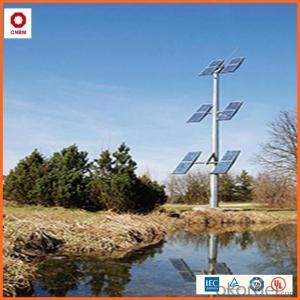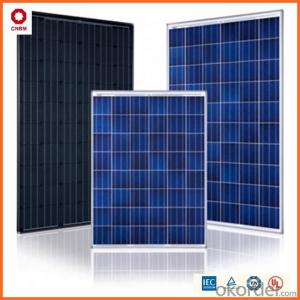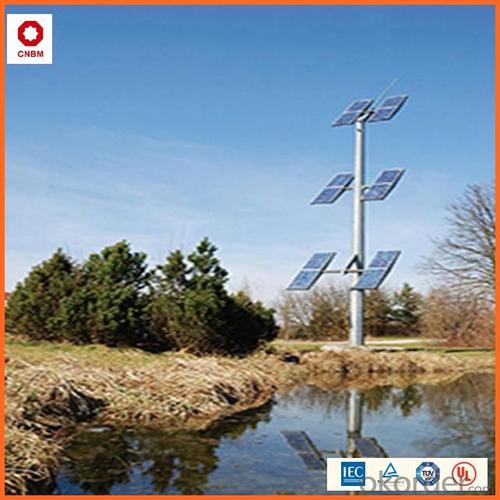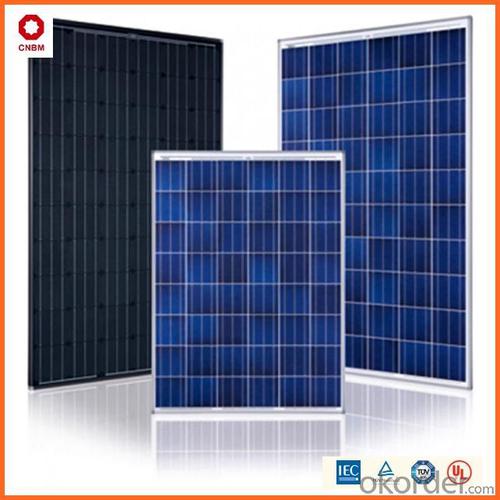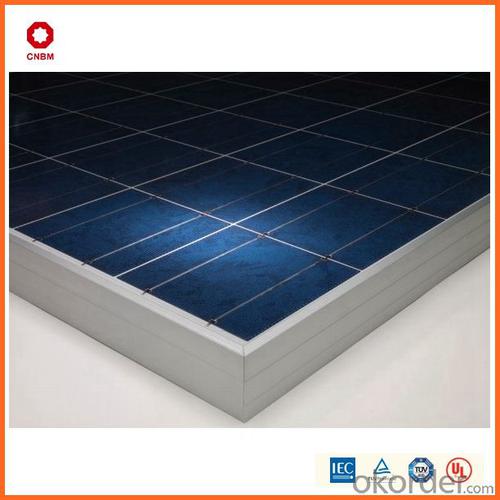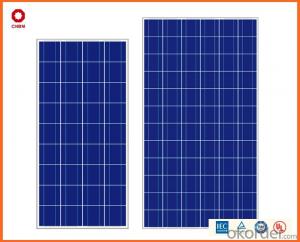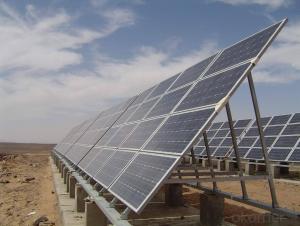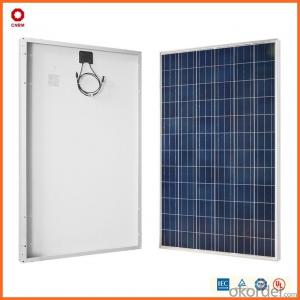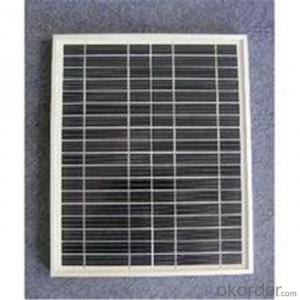Solar Energy Systems Rochester - Stock Small Solar Panel 50W Poly with Good Quality - Hot on Sale
- Loading Port:
- China main port
- Payment Terms:
- TT OR LC
- Min Order Qty:
- 1 watt
- Supply Capability:
- 10000000 watt/month
OKorder Service Pledge
OKorder Financial Service
You Might Also Like
Product Description:
Hot Sale !!! Quality and Safety of Small Poly Solar Panel 35~85w
1. Rigorous quality control meets the highest international standards.
2. High-transmissivity low-iron tempered glass, strong aluminium frame.
3. Using UV-resistant silicon.
4. IS09001/14001/CE/TUV/UL
Warranties of Small Poly Solar Panel 35~85w
1. 10 years limited product warranty
2. 15 years at 90% of the minimal rated power output
3. 25 years at 80% of the minimal rated power output
Technical date of 45w-85w Poly Solar Panel
ITEM NO.: | Mono 125*125 cell ,36pcs . Power range from 80Wp-100Wp | ||||||||
Maximum Power(W) | 80 | 85 | 90 | 95 | 100 | ||||
Optimum Power Voltage(Vmp) | 17.81 | 17.89 | 17.94 | 17.99 | 18.06 | ||||
Optimum Operatige Current(Imp) | 4.78 | 4.91 | 5.12 | 5.35 | 5.59 | ||||
Open Circuit Voltage(Voc) | 21.98 | 22.05 | 22.14 | 22.28 | 22.45 | ||||
Short Circuit Current(Isc) | 4.95 | 5.15 | 5.36 | 5.65 | 5.84 | ||||
Solar Cell: | 125*125 Mono | ||||||||
Number of Cell(pcs) | 4*9 | ||||||||
Brand Name of Solar Cells | JA Cell, Bluesun Cell | ||||||||
Size of Module(mm) | 1580*808*35 | ||||||||
Caple & Connector Type | Pass the TUV Certificate | ||||||||
Frame(Material Corners,etc.) | Aluminium-alloy | ||||||||
Backing (Brand Type) | TPT | ||||||||
Cell Efficiency for 100W(%) | 15.8% | ||||||||
Weight Per Piece(KG) | 12.0KG | ||||||||
FF (%) | 70-76% | ||||||||
Junction Box Type | Pass the TUV Certificate | ||||||||
Tolerance Wattage(e.g.+/-5%) | ±3%, or 0-3% | ||||||||
Front Glass Thikness(mm) | 3.2 | ||||||||
Temperature Coefficients of Isc(%) | +0.04 | ||||||||
Temperature Coefficients of Voc(%) | -0.38 | ||||||||
Temperature Coefficients of Pm(%) | -0.47 | ||||||||
Temperature Coefficients of Im(%) | +0.04 | ||||||||
Temperature Coefficients of Vm(%) | -0.38 | ||||||||
Temperature Range | -40°C to +85°C | ||||||||
Surface Maximum Load Capacity | 2400Pa | ||||||||
Allowable Hail Load | 23m/s ,7.53g | ||||||||
Bypass Diode Rating(A) | 12 | ||||||||
Warranty | 90% of 10 years,80% of 25 years. | ||||||||
Standard Test Conditions | AM1.5 1000W/ 25 +/-2°C | ||||||||
Packing | carton or pallet | ||||||||
1*20' | 25 Pallets / 450pcs | ||||||||
1*40'STD | 25 Pallets / 100pcs | ||||||||
Features of our products:
• High conversion efficiency mono/poly-crystalline amorphous silicon solar cells
• Modules incorporate high performance bypass diodes to minimize the power drop caused by shading
• High transmittance, low-iron tempered glass
• High performance EVA encapsulant to prevent destroying and water.
• AI frame: without screw, corner connection. 8 holes on the frame can be installed easily
• Good performance of preventing from atrocious weather such as wind and hails
• Certifications: CE IEC TUV VDE UL, Class I
• 10 years 90% power output warranty

Shipping of Small Poly Solar Panel 35~85w
By Sea | Delivery from Shanghai or Ningbo seaport |
By Air | Departure from Shanghai Pudong Airport |
By Express | Post by DHL, EMS, UPS, TNT. |
- Q: Can solar energy systems be used in areas with high levels of wildlife activity?
- Yes, solar energy systems can be used in areas with high levels of wildlife activity. While it is true that wildlife can pose some challenges for solar energy systems, there are several ways to mitigate these issues. One of the primary concerns is the risk of damage to the solar panels by large animals or birds. However, there are various protective measures that can be taken to prevent this. For instance, installing fencing or barriers around the solar panels can help keep wildlife away. Additionally, using anti-reflective coatings on the panels can reduce the likelihood of bird collisions. Another concern is the impact of solar energy systems on wildlife habitats. It is crucial to choose the location of the solar panels carefully, considering the existing wildlife activity in the area. By conducting thorough environmental impact assessments and engaging with local wildlife experts, it is possible to minimize any potential negative effects on wildlife habitats. Moreover, solar energy systems can actually benefit wildlife in some cases. For example, solar farms can provide additional shelter and shade for some species, and the open spaces underneath the panels can create new habitats for ground-dwelling animals. Overall, while there may be some challenges, with proper planning and mitigation strategies, solar energy systems can be successfully utilized in areas with high levels of wildlife activity.
- Q: Can solar energy systems be used for powering electric battery manufacturing plants?
- Yes, solar energy systems can be used to power electric battery manufacturing plants. Solar panels can generate electricity from sunlight, which can be used directly to power the manufacturing operations or stored in batteries for later use. By utilizing solar energy, these plants can reduce their reliance on fossil fuels, lower their carbon footprint, and contribute to a more sustainable and renewable energy future.
- Q: Can solar energy systems be used in areas with high levels of snowfall?
- Yes, solar energy systems can be used in areas with high levels of snowfall. While snow can reduce the amount of sunlight reaching the solar panels, it does not render them completely ineffective. Modern solar panels are designed to be efficient in various weather conditions, including snow. Additionally, the angle and tilt of the panels can be adjusted to shed snow and maximize sunlight absorption. In snowy regions, it is common to mount solar panels at steeper angles to help snow slide off. Furthermore, advancements in solar technology, such as the use of anti-reflective coatings and self-cleaning mechanisms, help prevent snow buildup and maintain optimal performance. It's worth noting that while snow can temporarily reduce energy generation, solar energy systems can still produce electricity even in cloudy conditions. Overall, with proper planning and maintenance, solar energy systems can be effectively utilized in areas with high levels of snowfall.
- Q: Can solar energy systems be used for powering off-grid eco-resorts?
- Yes, solar energy systems can be used to power off-grid eco-resorts. Solar panels can be installed to convert sunlight into electricity, which can then be used to power various appliances and facilities in the resort. This sustainable and renewable energy source aligns well with the eco-friendly concept of off-grid resorts, reducing reliance on fossil fuels and minimizing environmental impact. Additionally, solar energy systems can be combined with energy storage solutions, such as batteries, to ensure a continuous power supply even during periods of limited sunlight.
- Q: Can a solar energy system be installed on a boat or RV?
- Indeed, it is possible to install a solar energy system on a boat or RV. Nowadays, it is becoming increasingly popular for boat and RV owners to incorporate solar panels to supply power to their electrical systems. These panels can be affixed to the roof or deck of the boat or RV, or they can be portable and assembled as required. By capturing sunlight and transforming it into electricity, these panels enable the charging of batteries, operation of appliances, and usage of various electrical devices. The installation of a solar energy system on a boat or RV presents several advantages. Firstly, it diminishes reliance on conventional fuel sources, offering a sustainable and renewable energy alternative. Secondly, it grants individuals greater freedom and flexibility in remote areas where access to electricity may be limited. Moreover, solar panels are lightweight, robust, and require minimal maintenance, making them highly suitable for the mobile nature of boats and RVs.
- Q: Can a solar energy system be installed on a ground mount?
- Yes, a solar energy system can be installed on a ground mount. In fact, ground-mounted solar systems are quite popular and offer several advantages over roof-mounted systems. Ground-mounted systems are typically larger in size and can accommodate more solar panels, allowing for greater energy production. They can also be installed at the optimal angle and orientation for maximum sunlight exposure, which may not always be possible on a roof. Additionally, ground-mounted systems are easier to access for maintenance and cleaning, as they are not located on the roof. Therefore, if you have sufficient space available on your property, a ground-mounted solar energy system can be an excellent option for generating clean and renewable energy.
- Q: How does the performance of solar panels degrade over time?
- The performance of solar panels degrades over time due to various factors such as exposure to sunlight, temperature fluctuations, and environmental conditions. These factors can cause the panels to degrade gradually, resulting in a decrease in their efficiency and power output. Additionally, the accumulation of dirt, dust, and debris can also impact the performance of solar panels over time. Regular maintenance and cleaning can help mitigate this degradation and ensure optimal performance.
- Q: How do solar energy systems impact the electric grid?
- Solar energy systems positively impact the electric grid by generating clean and renewable electricity. They help reduce the demand on the grid during peak hours and contribute to a more balanced and reliable power supply. Additionally, excess energy generated by solar systems can be fed back into the grid, reducing the need for traditional power plants and promoting energy independence.
- Q: Can solar energy systems be used in areas with frequent snowfall?
- Yes, solar energy systems can still be used in areas with frequent snowfall. While snow can temporarily reduce the efficiency of solar panels by covering them, modern solar panel designs and technologies are capable of generating electricity even in low light conditions. Additionally, the angle at which solar panels are installed can be optimized to allow snow to slide off more easily. With proper maintenance and snow removal, solar energy systems can still be a viable and sustainable energy solution in snowy regions.
- Q: Can solar energy systems be used in areas with saltwater exposure?
- Yes, solar energy systems can be used in areas with saltwater exposure. However, it is important to use proper materials and equipment that are resistant to corrosion caused by saltwater. Regular maintenance and cleaning may also be required to prevent any build-up or damage.
Send your message to us
Solar Energy Systems Rochester - Stock Small Solar Panel 50W Poly with Good Quality - Hot on Sale
- Loading Port:
- China main port
- Payment Terms:
- TT OR LC
- Min Order Qty:
- 1 watt
- Supply Capability:
- 10000000 watt/month
OKorder Service Pledge
OKorder Financial Service
Similar products
Hot products
Hot Searches
Related keywords
